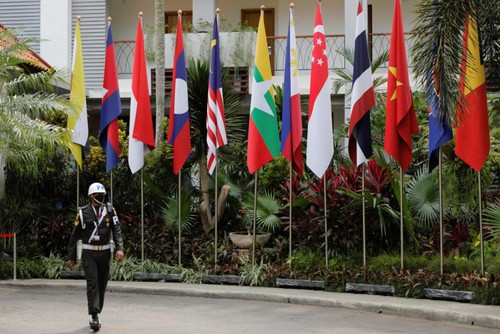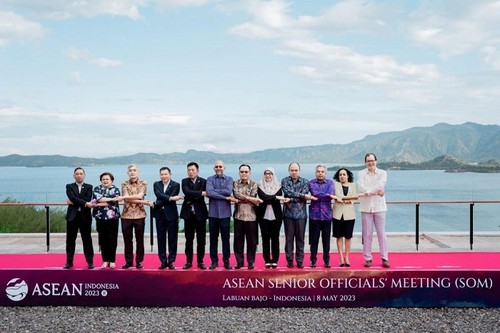 The flags of ASEAN countries attend the 42nd ASEAN Summit in Labuan Bajo, Indonesia, on May 8th, 2023. (Photo: Reuters) The flags of ASEAN countries attend the 42nd ASEAN Summit in Labuan Bajo, Indonesia, on May 8th, 2023. (Photo: Reuters) |
The leaders of 10 ASEAN countries will discuss the bloc’s issues as well as regional and global current affairs and agree on ASEAN’s behavior orientation and practical contributions to finding solutions.
Determination to recover the economy sustainably
The ASEAN summit takes place in the context of the global economy facing various difficulties. Fluctuations in some regions are putting the world at the risk of energy and food crises, inflation, and economic recession. These factors have strongly affected ASEAN economies, which are very dependent on external conditions.
Economic recovery and development has been the focus at ASEAN meetings at all levels and an important topic at meetings between ASEAN leaders and partner countries. At this summit ASEAN is acutely aware of the need to coordinate actions and solutions at the national and regional scale.
A new feature of the summit is the more diverse dialogue sessions between the leaders and groups on ASEAN community building process.
The summit will adopt a number of important documents on politics-security, economy, and culture-society. The documents attach to ASEAN’s priorities for this year, which are financial stability, energy security, and regional recovery and growth. The agenda covers economic issues, digital economic development, climate change response, and the promotion of ASEAN’s Indo-Pacific Vision, including economic cooperation, maritime connectivity, and sustainable development goals.
 (Photo: asean.org) (Photo: asean.org) |
Maintaining ASEAN’s centrality
Growth is one of the goals set by Indonesia as ASEAN Chair this year to turn ASEAN into a regional and global economic growth center and strengthen the bloc’s central role in responding to challenges.
ASEAN continues to attract external partners who wish to upgrade relations and participate in ASEAN-led mechanisms. ASEAN’s position in the Asia-Pacific region and in the world has been steadily enhanced. ASEAN is currently considered the second most successful regional organization in the world after the European Union.
ASEAN has established strategic partnerships with eight countries and comprehensive strategic partnerships with two countries. World powers appreciate the central role of ASEAN and consider tightening ties with ASEAN one of the priorities of their Indo-Pacific strategy.
ASEAN is the center of the free trade agreement network in the region and continues to be the driving force in promoting regional and sub-regional economic cooperation and linkage, most recently the Regional Comprehensive Economic Partnership (RCEP) signed in November 2020.
ASEAN Secretary-General Kao Kim Hourn said ASEAN will continue cooperation to ensure its attractiveness to partners. The bloc gives high priority to maintaining peace, stability, and security in the region, considering it a vital factor.
By promoting dialogue, building trust, and making efforts to create an open, transparent, and rule-based regional architecture towards peace, stability, and development, ASEAN has achieved many successes since its establishment in 1967.
ASEAN has raised its position and enlarged its role and voice at the regional and global level thanks to its balanced approach and solidarity and its effective response to challenges.